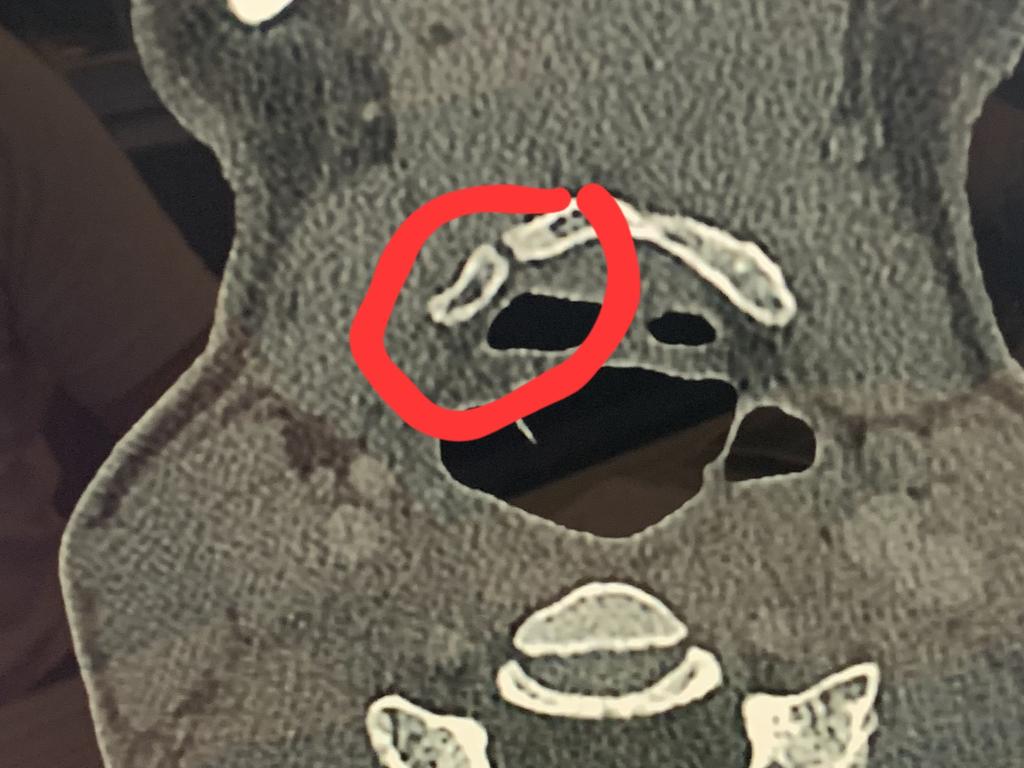‘He’s a monster’: Government mulling early release of violent prisoner who terrorised woman
He kept a woman captive for three years, brutally abusing her and causing lifelong damage, but this “monster” could soon be free on “gardening leave”.
A man behind bars for the brutal abuse of his former partner, who he left with lifelong health issues after one severe strangulation, is being considered for periodic release as part of a government program.
Jamie Damian Millard is serving an almost five-year sentence in a Canberra prison after pleading guilty to repeatedly assaulting and strangling Bree Hall, in what a judge called “brutal, cowardly and inexcusable” domestic violence.
Those convictions are just part of a 19-page criminal history spanning several years that includes assaults, drug use and dangerous driving.
Before he was jailed for his abuse of Ms Hall, the 43-year-old was also convicted and imprisoned over an unrelated violent attack on a 15-year-old girl, who he strangled.

“I just can’t believe they’re thinking of releasing him on what’s effectively gardening leave,” a terrified Ms Hall told news.com.au.
“He is determined to make me pay and the government is giving him a free pass to do so.”
Cushy ‘gardening leave’ awaits
On Tuesday, officials from ACT Corrective Services will formally assess Millard for a spot in the government’s Transitional Release Program.
The scheme, which the government says “supports rehabilitation and prepares detainees for (a) return to the community”, puts inmates in a minimum security setting and offers periodic day release.
Should he be accepted, Millard could be out in the community within weeks.
“Basically, if he gets into this program, he gets to live in a separate housing unit, he can apply for leave, so he gets to walk out for a break basically, and he can even work,” Ms Hall said.
“It’s like gardening leave. A prisoner as violent as him doesn’t deserve that kind of special privilege.”

Ms Hall is terrified by the idea of Millard being outside the confines of a cell, able to get to her if he wishes.
“I know this man. I had to play his sick game for three years in order to survive. I know how he works. I fear for my life if he’s freed. I’m terrified,” she said.
A three-year living hell
After meeting online in 2015 and commencing a relationship the following year, Ms Hall and her two children were virtually kept as prisoners in Millard’s home in the nation’s capital.
Millard warned she would be murdered if she tried to flee.
For three years, she was subjected to repeated and frequent physical, sexual and emotional abuse, as well as extreme coercive control.
Millard monitored her phone usage, controlled what clothing she wore, and dictated when she could shower. He erected nine-foot high fences around his property and installed surveillance cameras.
“It was the most horrific time of my life,” Ms Hall, now 43, recalled.
“Sometimes, I can’t believe I survived. It was hell. He removed me from the outside world and I lost everything – contact with my friends and family, control over my life, my sense of self.”
Ms Hall said she was strangled severely on three occasions.
During one violent attack, Millard broke her hyoid bone – an injury that’s typically fatal given the proximity to a major artery.
While she survived, Ms Hall has suffered major health impacts since, including a stroke. She’s scheduled to undergo her 12th surgery as a result of the injury next month.


With the assistance of police, Ms Hall fled in July 2019.
Even after she was physically free of him, Millard continued to menace and harass her, she said.
During one court appearance, he was overheard telling his lawyer about attempts to track Ms Hall down and send someone to deal with her.
On another occasion, he was served with court documents that had her contact details concealed with white-out.
Somehow, Millard was allowed to take the documents back to his prison cell.
A sweep conducted by prison authorities later recovered them – with the white-out removed and her address visible.
‘Shouldn’t be considered’
When he was sentenced in September 2022, Magistrate Louise Taylor said Millard’s frequent strangulations were a way of sending a message to Ms Hall that he “held her life literally in his hands”.
Ms Hall said he showed no remorse and she doubts his prospects of rehabilitation.
“He’s shown no regard for what he’s done,” she said. “He hasn’t taken ownership of it and he never will. He’s dangerous and he’s violent. I just can’t understand why he’s being considered for this.
“I mean, his criminal history speaks for itself. That isn’t the kind of person you reward with early release.
“He’s a monster. While he’s locked up, I feel safe. If he’s out, I lose that.”

A spokesperson for ACT Corrective Services declined to comment on Millard’s case for privacy and confidentiality reasons.
But the spokesperson said community safety, including the safety of domestic and family violence victims, is a priority.
“Detainees can apply … once they meet the eligibility criteria. However, participation in the program is contingent on comprehensive risk assessments,” they said.
“Detainees who pose an unacceptable risk to community safety or whose participation would undermine public confidence in the justice system are not permitted to participate.
“When considering a detainee’s suitability for transitional release, (ACT Corrective Services) takes into account victims’ views and those of their liaison officer.”






